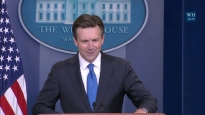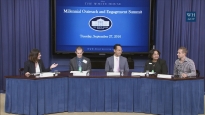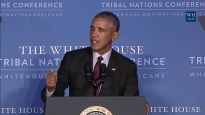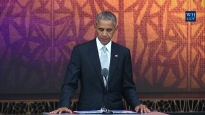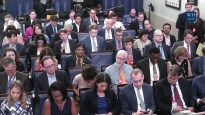Controlling Gas Prices and Creating New Jobs
May 06, 2011 | 17:30 | Public Domain
President Obama talks about how encouraging and developing new energy technologies can help control gas prices and create new American jobs as he visits the Allison Transmission Headquarters in Indianapolis, IN.
Remarks by the President to Workers at Allison Transmission Headquarters
Indianapolis, Indiana
12:10 P.M. EDT
THE PRESIDENT: Thank you, everybody. Good to see you. (Applause.) Thank you so much. Thank you, everybody. Please have a seat. Thank you. It is good to be back in Indianapolis. (Applause.) Hello, Hoosiers! Sorry about the Pacers. (Laughter.) I'm sorry, Mr. Mayor. (Laughter.) Give the Mayor a big round of applause. He’s doing a great job. (Applause.)
Along with the Mayor, we've got Secretary of Transportation Ray LaHood in the house. Ray -- (applause.) We've got your own member of Congress, André Carson, here. (Applause.) And I want to thank Larry Dewey and everybody here at Allison for their extraordinary hospitality.
It is wonderful to be here. I just had a chance to see the hybrid systems that you’re working on at the plant. I love to see high-tech machinery like this. I stand there and people explain it to me and I pretend like I know what they’re talking about. (Laughter.) But it looked outstanding. (Laughter.)
What you’re doing here at Allison Transmission is really important. Today there are more than 3,800 buses using hybrid technology all over the world -– buses that have already saved 15 million gallons of fuel. And pretty soon, you’ll be expanding this technology to trucks as well. And that means we’ll have even more vehicles who are using even less oil. That means more jobs here at Allison. Last month, you added 50 jobs at this company and I hear that you plan to add another 200 over the next two years. So we are very proud of that. We are very happy about that. (Applause.)
This is where the American economy is rebuilding, where we are regaining our footing. We just went through one of the worst recessions in our history, worst in our lifetimes, the worst since the Great Depression. But this economic momentum that's taking place here at Allison is taking place all across the country. Today we found out that we added another 268,000 private sector jobs in April. (Applause.) So that means over the past 14 months, just in a little bit over a year, we’ve added more than 2 million jobs in the private sector.
Now, we’ve made this progress at a time when our economy has been facing some serious headwinds -- and I don't need to tell you about that. We've got high gas prices that have been eating away at your paychecks. And that is a headwind that we've got to confront. You’ve got the earthquake in Japan that has had an effect on manufacturing here. So there are always going to be some ups and downs like these as we come out of a recession. And there will undoubtedly be some more challenges ahead.
But the fact is that we are still making progress, and that proves how resilient the American economy is, and how resilient the American worker is, and that we can take a hit and we can keep on going forward. That’s exactly what we're doing. (Applause.)
Now, despite the good work that's being done in Allison, obviously here in Indiana and all across the country there’s still some folks who are struggling. And a lot of people are thinking, where are those new jobs going to come from, that pay well, have good benefits, can support a family? And how do we finally reduce our dependence on oil so that we’re not hostage to high gas prices all the time?
The reason I’m here today is because the answers to these questions are right here at Allison, right here in these vehicles, right here in these transmissions. This is where the jobs of the future are at. We’re going to have a lot of jobs in the service sector because we’re a mature economy, but America’s economy is always going to rely on outstanding manufacturing, where we make stuff -- where we’re not just buying stuff overseas, but we’re making stuff here, and we’re selling it to somebody else. And that's what Allison is all about. (Applause.)
This is also where a clean energy economy is being built. This is the kind of company that will make sure that America remains the most prosperous nation in the world. See, other countries understand this. We’re in a competition all around the world, and other countries -- Germany, China, South Korea -- they know that clean energy technology is what is going to help spur job creation and economic growth for years to come.
And that's why we’ve got to make sure that we win that competition. I don't want the new breakthrough technologies and the new manufacturing taking place in China and India. I want all those new jobs right here in Indiana, right here in the United States of America, with American workers, American know-how, American ingenuity. (Applause.)
And that's also how we’re going to get gas prices under control. Now, I confess, it’s been a while since I filled up. (Laughter.) Secret Service doesn't let me fill up my motorcade. (Laughter.) But it hasn’t been that long ago since I watched those numbers scroll up and I know how tough it is. If you’ve got to drive to work, and you may not be able to afford buying a new car, so you’ve got that old beater that gets you eight miles a gallon, it’s tough. It is a huge strain on a lot of people.
But if we can transition to new technologies, that's what’s going to make a difference over the long term. That's how we’re going to meet the goal that I’ve set of reducing the amount of oil that we import by one-third by the middle of the next decade.
We can hit that target. We can hit that target.
Now, in the short term, we still need to do everything we can to encourage safe and responsible oil production here at home. In fact, last year, American oil production reached its highest level since 2003. So I want everybody to remember that if people ask -- because sometimes I get letters from constituencies saying, why aren’t we just drilling more here? We’re actually producing more oil here than ever. But the challenge is we’ve only got about 2 to 3 percent of the world’s oil reserves and we use 25 percent of the world’s oil. So we can’t just drill our way out of the problem.
If we’re serious about meeting our energy challenge we’re going to have to do more than drill. And that’s why the real solution is clean, homegrown energy. The real solution is advanced biofuels -- and there’s a lot of good biofuel work being done here in Indiana. It means that we’ve got to have natural gas vehicles. We’ve got a lot of natural gas that can be produced here in the United States of America. It means making our cars and trucks more energy-efficient, because if we use less oil, that reduces demand; that brings the price down; and you will see the impact at the pump. That’s what’s going to make a difference and that’s why what you’re doing here is so important.
Now, it turns out even though they don’t let me go to the gas pump, I do have a lot of cars under my jurisdiction, as President. The federal fleet is enormous, and we’ve already doubled the number of hybrids in the federal fleet. And I’m directing every agency to make sure that 100 percent of our cars and trucks are fuel-efficient or clean-energy vehicles by 2015. So you’re going to have a customer, hopefully in the United States government, because we want to make sure -- (applause) -- that we are making clean fuel-efficient cars and trucks. (Applause.)
We’ve also launched private sector partnerships with companies like FedEx, UPS, utility companies. A lot of these companies that have trucks and delivery trucks that are used in urban areas with a lot of stops and starts are perfect for the technology that you’re building. So we’re forming partnerships to make sure that you’ve got more customers.
And to spur the production of fuel-efficient cars and trucks across the country, we’ve reached an historic agreement with every major auto company. Thanks to the leadership of Ray LaHood, they’re ramping up the fuel economy of their cars and trucks. And that will not only save 1.8 billion barrels of oil, it’s going to save you, the average driver, about $3,000 at the pump as cars increasingly get better gas mileage.
And this July, we’re finalizing new fuel-efficiency standards for heavy-duty trucks for the first time in our history. And that could actually end up saving us -- we were talking about this the other day -- it could end up saving us something like 500 billion barrels of oil, huge amounts of oil, because heavy trucks use so much.
We’re also promoting clean energy technologies in other ways, from investing in hybrid systems like the one Allison is developing for commercial trucks, to championing vehicles that run on clean-burning natural gas, to spurring the creation of next-generation batteries for electric vehicles.
You know, a few years ago, America only produced 2 percent of the world’s advanced batteries. Those are the batteries that are going into these new electric cars. Because of the investments that we made in the first two years that I was in office, we’re on track to produce 40 percent of the advanced batteries. That is going to be a huge boon to American manufacturing. (Applause.) That’s an example of a big new industry that we can create right here in the United States of America.
And to make sure we’re not only investing in clean energy technologies but encouraging people to use these new technologies, I’ve proposed a $7,500 tax rebate for electric vehicles. So if you do have that old beater that you need to get rid of, and you decide that you’re going to buy a new car, choosing an electric car you can actually get a huge rebate that will save you money at the gas pump, but is also going to save money on your tax returns. And that will make a big difference.
We should reward also communities that are making it easier for folks to use electric vehicles and leading the way when it comes to clean energy. And that’s the kind of leadership that Indianapolis is showing. You’re installing natural gas pumps around town and you’re taking other steps to promote clean energy. And I hope cities and towns across this country follow in your example.
Of course, these investments in clean energy do cost some money, and we’re going to need to find a way to pay for them. Part of the cost can be made up by putting an end to the unwarranted subsidies that we are giving oil companies right now through the tax code. (Applause.) I want everybody to listen here. Oil companies over the last five years, through a recession, through ups and downs, the top five oil companies, their profits have ranged between $75 billion and $125 billion. That's with a B -- not million; billion. And yet, they still have a tax loophole that is costing taxpayers $4 billion every year. Now, if you're already paying them at the pump, we don't need to pay them through the tax code. We do not need to do it. (Applause.) Especially at a time when we’re scouring every part of the budget to try to figure out how we bring down our deficit and our debt.
Now, if we’re honest with ourselves, we’ll admit that even if we end these taxpayer subsidies, we’re still going to have more work to do in getting control of our deficit and debt. And I know that in this difficult fiscal climate, it may be tempting for some people to say let’s stop investing in hybrid technology; let’s stop investing in basic research; let’s stop investing in the infrastructure that's needed to make sure that we can transition to new forms of transportation. That's the temptation. But I profoundly disagree with that approach.
If we’re going to win the future, we’ve got to cut out the things we don't need, but still make investments in the things that we do. That's what you do at home. If somebody in your family loses a job, if your hours get cut, what do you do? You may stop going out to a restaurant to eat. You may decide we’re going to put off buying that new furniture or taking that vacation. But you’re not going to stop fixing the boiler or the hole in the roof. You’re not going to stop making sure that you got enough money to help your kids go to school. Those are the things -- that's like your seed corn. You don't eat that.
The same is true for the federal government. We can’t cut investments in clean energy that are going to help us out-innovate and out-compete and help America win the future. We’re not going to stop making investments that allow plants like this one to find the new ways of doing business in the future.
I want to make sure the federal government is right here with you as a partner with you as you move forward, and we can do it and still get control of our debt and our deficit if we do it smart.
For nearly 100 years this company has made its way forward through ups and through downs, making advances that have transformed everything from buses to planes to tanks. Jim Allison actually helped start the Indy 500 back in 1909 -- not just to race cars, but to test new racecar components. And that same spirit of innovation and ingenuity is what I’ve seen in the workers that I talked to today.
And that's why I’m so confident in this country. That's why I’m so optimistic about our economic future -- because I believe in all of you. I believe in the American worker, and I believe in American business. For all the challenges we face, this country is still home to the most entrepreneurial, most industrious, most determined people on the planet. There is nothing we cannot do so long as we put our mind to it, so long as we keep our eyes on the prize. (Applause.)
And I’m going to keep on working with you to make sure we do that so long as I have the privilege of being President of the United States.
Thank you, everybody. God bless you. God bless the United States of America. (Applause.)
END
12:28 P.M. EDT
|
September 28, 2016
|
September 27, 2016
|
September 27, 2016
|
September 26, 2016
|
|
September 26, 2016
|
September 24, 2016
|
September 24, 2016
|
September 23, 2016
|
- &lsaquo previous
- …
- 19
- 20
- 21
- 22
- 23
- 24
- 25
- 26
- 27
- …
- next &rsaquo

